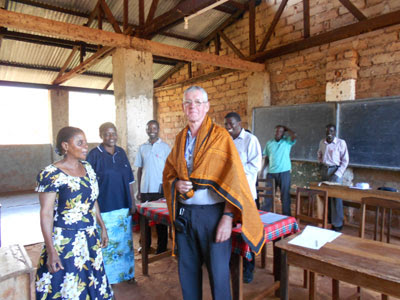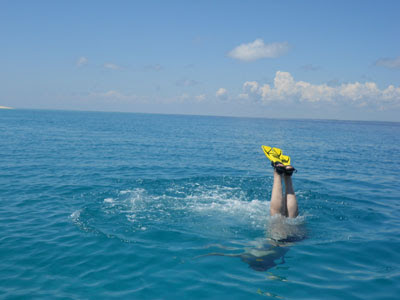Well, the adventure is over and this is the final entry in
this particular blog. I’d like to thank Google
for making this all possible. I’d like
to thank the MS Word Dictionary for drawing red squiggly lines under all my
Swahili words and their Thesaurus for providing alternatives to my otherwise
endless repetition. I’d like to thank my
family for allowing me to take this adventure, especially the ever patient
Chez. I’d like to thank my readers for
the emails of encouragement I have received and finally I’d like to thank THE
HILL which added so much to the feeling that this was an adventure and not just
a prolonged holiday. (Pause for Gwyneth Paltrow like tears)
Friday was spent packing and organising what I would take and what would be useful to leave. The flask, food containers, first aid kit and the little gismo I have that is a cross between an Swiss Army Knife and a pair of pliers, were all presented to the various workers here and certainly I had less problems closing my suitcase than when I set off. I did manage to fit in a swim as Deo, Suzi and Chita joined me for my last dip in the Indian Ocean, for this year at least.
The day was marred as the previous night Mama Gladness found
out that her Mother’s sister had died and she would not be around to see me off
as she had to travel to Moshi for the funeral.
The rest of the gang though had arranged to have a meal together with me,
which was a treat as the vast majority of my meals had taken place in solitary splendour.
As we had a drink and waited for the meal I looked out through the darkness and
saw somebody coming up the path from the beach. I was amazed to see that, for
the first time whilst I had been here, John had forsaken his Masai outfit and
his knife and was dressed in slacks and shirt, and very smart he looked as
well. As I was returning home he told me
that after Christmas he would be visiting his family in the Masai heartlands
near Arusha, to see his wife, ten year old daughter and two year old son for
the first time in nearly a year.
We had a lovely meal of skewered beef and rice and there
were more presentations of items made with the local material, but without the
presence of Mama it was a little downbeat.
The following morning as well as my VIP Class seat I decided
to really treat myself and booked a taxi for my final journey to Tanga, which
removed the difficulty of getting two cases down to Pangani to ensure a seat on
the bus. Having ensured that both dogs
were tied up, as I didn’t fancy having to return all the way back with Chita, I
waved my goodbyes and set off on my most comfortable journey yet to the
regional capital.
Even now, Tanzania was to provide me with memories as I
arrived at the Bus Stand at Tanga, ready with my luggage, to find that there
was a hold up at the Kenyan/Tanzanian border and there would be a delay of
about ninety minutes. The Kindle came
out again as I sat on some chairs provided for the customers, and I continued
my reading even when it looked as if the Arsenal team coach had pulled into the
square.
Eventually my bus arrived and, with my suitcases stowed
below, I climbed the steps, to find my seat occupied by an old lady of Indian ethnicity. I was asked to sit in another seat whilst the
local agent and his two helpers argued at length with the lady, whose ticket
said seat 18 further down the bus, even phoning Mombassa to confirm that she
hadn’t paid extra to move up the bus, as she claimed. All this was taking place as the bus pulled
away from the square and drove through the streets of the town before pulling
up outside a restaurant that obviously doubled as a restroom. Here the lady got off and I was told that she
said she was going back to Mombasa, but I did see her later in the journey sitting
further down the bus. T.I.A.
The journey was uneventful and even a very comfortable seat
could not reduce the travelling time of six hours so by the time I had met
Karim and been transported once more to Mikocheni B, there was not much time
left before nightfall. I settled in my
room and decided I might go down to the bar and watch the final of the East
African football cup, but when I got down there I found that the locals had
decided that Sunderland v Chelsea was much more important, so I had to wait for
a triumphant text from Denis to find that Uganda were, for the second year
running, East African champions.
Sunday was very much a damp squib and lead to the title of
this post. I had to leave the hotel by ten
so Karim picked me up, put my luggage in his boot for the day and dropped me
off at Slipway, a tourist shopping area, about thirty minutes later, with the agreement
that he would pick me up at eight that evening to take me to the airport. Eight and a half hours is a long time to
spend shopping for presents and the high-spot was a thirty minute tour of the
back streets of Dar es Salaam in a Bajaj trying to find an Internet Café that
was open on a Sunday. We eventually
found one and looking round the district I promised the Bajaj driver a good
bonus if he returned for me after ninety minutes; which thankfully he did.
Karim was as reliable as ever and dropped me at the airport
with three hours to go through the interminable queuing, form-filling and two sets
of luggage scanners and belt removals that are needed to even leave the
country.
Long plane journeys are a bore to endure and worse to report
so suffice to say I arrived back at a very cold Leeds/Bradford to be met by
Paul, who thoughtfully had brought my coat and scarf to the airport, only to
leave it in the car as he met me inside the terminal. Good to be home and know that nothing has
changed.
There isn’t really an epilogue because you should know well
by now how I feel about my adventure and my feelings about Tanzania. Nimependa Tanzania, nimependa Pangani,
nimependa Chapattis na nimependa sana watoto wangu.
If you are interested there is a list, from memory, of the
Swahili I learned whilst out here, although I keep thinking of words that I can
add. You’ll find it here
Kwaheri






















